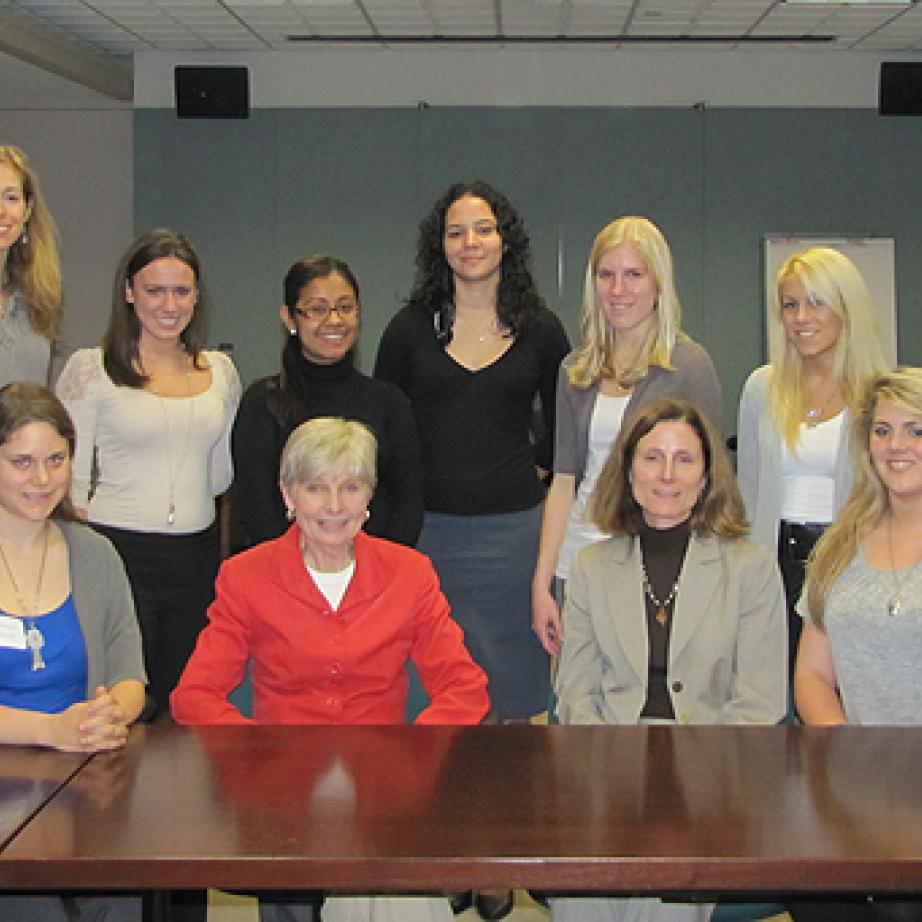Friday, Oct 29, 2010
Eleanor Clift, the Woodrow Wilson Visiting Fellow at Rider University, shared her thoughts during the Center for Leadership Skills’ Excellence in Executive Leadership Dinner.
by Meaghan Haugh
Feel the fear and do it anyway. Don’t be a perfectionist. Don’t be afraid of being a woman. Be yourself.
Those were some of the words of advice that Eleanor Clift, the Woodrow Wilson Visiting Fellow at Rider University, shared with a small group of female students, faculty and staff during the Center for the Development of Leadership Skills’ Excellence in Executive Leadership Dinner on October 25. As a contributing editor for Newsweek, Clift writes about a variety of issues, including the Washington power structure, the influence of women in politics, and the policy and politics of the Obama administration. Clift is also author and co-author of a number of books, including War Without Bloodshed: The Art of Politics; Madam President: Shattering the Last Glass Ceiling; Founding Sisters and Two Weeks of Life: A Memoir of Love, Death and Politics.
“Given that she is such a strong and prominent leader in the field of politics, I thought it would be fantastic for Eleanor Clift to discuss women’s leadership in an informal environment,” said Laura Seplaki, associate director of Center for the Development of Leadership Skills. “I wanted to give students the opportunity to hear more about her personal story — her rise in the world of politics and how being a woman influenced her experiences over the years.”
Clift, who began her career as a secretary to Newsweek’s National Affairs editor in New York in the 1970s, recalled the controversy that erupted around a cover profile on feminist icon Gloria Steinem. Newsweek editors wanted to have the story written by a female, but rather than assign it to one of Newsweek’s own female staff researchers – the magazine had almost no women reporters – a decision was made to hand the job to the inexperienced wife of a male reporter. Newsweek’s own female researchers subsequently filed a class action lawsuit against the magazine. And as a result, Newsweek established an affirmative action plan and an internship for female reporters. Clift applied for and was placed in the internship program.
Clift became one of the first women at the magazine to advance from secretary to reporter, a craft she essentially taught herself while writing business articles. After covering Jimmy Carter’s 1976 bid for the presidency as a reporter in Newsweek’s Atlanta bureau, Clift followed Carter to Washington to become Newsweek’s White House correspondent.
“That’s how I got to Washington,” she said. “And I call that my Cinderella story.”
Later, Clift served as a congressional and political correspondent for six years and was a key member of the magazine’s 1992 election team, following the campaign of Bill Clinton. In June of that year, she was named deputy Washington bureau chief. Two years later, she became Newsweek’s contributing editor.
“I think the opportunities are there if you want to take advantage of them,” Clift told the group, composed of mostly students. “Feel the fear and do it anyway. That’s my motto. You have to have some anxiety in order to have the drive to be successful.”
In addition to listening to Clift’s insights into her own personal leadership journey, as well as her thoughts on the current political spectrum, participants had a chance to discuss their own experiences and ask questions.
Dr. Anne Carroll, associate professor of Finance, asked Clift to share some of the negative lessons she has learned. In response, she described how after observing the way Elizabeth Dole would take the time to plan her shoes to correspond with the carpet color she would be standing on for an event, Clift learned how time consuming it can be to be a perfectionist.
“Don’t be a perfectionist,” Clift advised. “Don’t be afraid of being a woman, either. Be yourself.”
Jesenia Arcasi, a sophomore Business Administration major, asked Clift how she became such an effective speaker. Clift said she used to be terrified of public speaking, so she took a course on the subject. She said it’s all right to have some anxiety, but one way to get over the fear of public speaking is by doing it.
“You have to think, ‘This is information I want to get out. This is not about me,’” Clift said.
For more than 35 years, the Woodrow Wilson Visiting Fellows program has brought prominent artists, diplomats, journalists, business leaders, and other nonacademic professionals to campuses across the United States for week-long residencies of teaching and dialogue with students and faculty members.
Clift’s visit continued through October 29. During her week at Rider, she also spoke during a series of classes and informal discussions. Topics include the role of media in American elections, women in politics and international politics.
“Ms. Clift’s visit to Rider University is an excellent opportunity for so many of our students to interact with a major contributor to media and to politics in the United States,” said Dave Keenan, director of Campus Life. “Her visit is a unique opportunity for students from many different disciplines, ranging from political science, communications and gender studies. We’re very honored that Ms. Clift chose to visit us this fall.”

